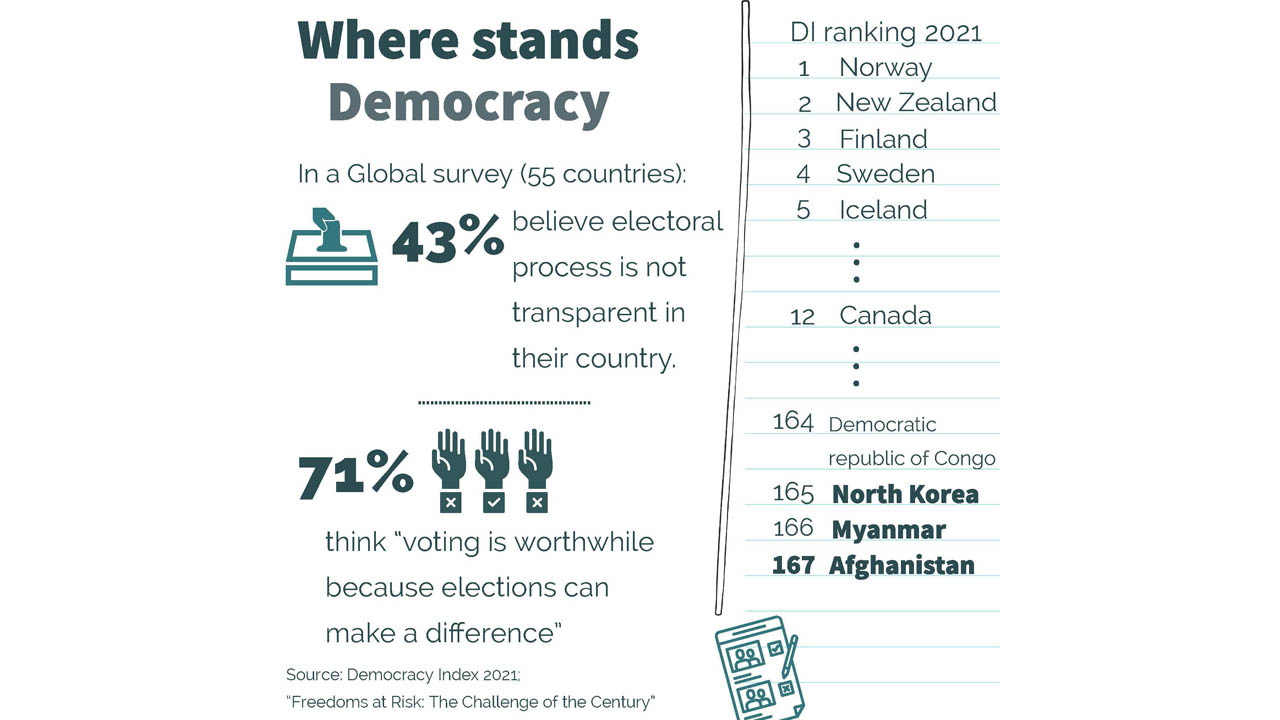Sustainability Today: Take a step in the democratic process
 CREDIT: FANSHAWE SUSTAINABILITY
CREDIT: FANSHAWE SUSTAINABILITYAccording to the Economist Intelligence's Democracy Index 2021, 37.1 per cent of the world's population was under Authoritarian regimes.
Abraham Lincoln, the 16th US president, once said: “The ballot is stronger than the bullet.”
What was once a new idea, or as some say the reincarnation of an ancient one, democracy now is an essential part of our lives. A beautiful thing about it, as Lincoln’s maxim outlines, is that it pledges to be a representative of the voices of all participants for their well-being. This it does through the process of election.
But, as wonderful as it sounds, democracy is not the norm everywhere. According to the Economist Intelligence’s Democracy Index 2021, 37.1 per cent of the world’s population was under Authoritarian regimes.” What’s more worrying is that 39.3 per cent of the world’s population was classified as being under “Flawed Democracies.”
Acts such as war, genocide, coup, rigged elections, corruption, and draconian rules erode people’s trust in governing intuitions. This mistrust often leads to violence, hampering any democratic progress. What is needed are just and strong institutions that uphold peace. Here is where the Sustainable Development Goal 16 (Peace, Justice and Strong Institutions) comes into picture. It focuses on building and sustaining credible institutions that are immune to corruption, ensure peace, and deliver justice. Fortunately, we live in a part of the world where we don’t have to bear the brunt of weak institutions. Globally, one in six businesses are asked for bribes by public officials. North America has the lowest bribery incidences at 8 per cent. Contrast this to Eastern and Southeastern Asia where the figure is 30 per cent.
As students, we might think that we have limited power in such matters, but examples across the globe have shown us that student movements can bring about great change. Student protests in the 1960s in the US against the Vietnam War, and the Fridays For Future movement, started by environmental activist Greta Thunberg that propelled the topic of climate change into mainstream conversations, are great examples of this. Although there are systemic issues that need to be addressed, a fair electoral process is a great place to start. We can begin by voting responsibly, researching candidates and voicing our concerns and expectations. This can be done at college level (Fanshawe Student Union elections) and, if you are eligible, at various levels of government. Try to keep a sustainable future in mind and vote for not just what is best for you but also what is good for society, including the less fortunate and those whose voices are stifled.
Days to look forward to:
- March 17: Semester for Sustainability Booth (Theme: SDG 14 and 15 — Life Below Water and Land)
- March 20: International Day of Happiness
- March 21: International Day for the Elimination of Racial Discrimination, International Day of Forests
- March 21–27: Week of Solidarity with the Peoples Struggling against Racism and Racial Discrimination
- March 22: World Water Day
- March 24: International Day for the Right to the Truth concerning Gross Human Rights Violations and for the Dignity of Victims, Semester for Sustainability Booth (Theme: SDG 16 and 17 — Peace and Institutions, Partnership)
- March 25: Earth Hour (8:30 p.m. to 9:30 p.m.) Booth location and time: B Building, London Campus; 11 a.m. to 3 p.m.














